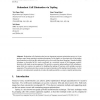Free Online Productivity Tools
i2Speak
i2Symbol
i2OCR
iTex2Img
iWeb2Print
iWeb2Shot
i2Type
iPdf2Split
iPdf2Merge
i2Bopomofo
i2Arabic
i2Style
i2Image
i2PDF
iLatex2Rtf
Sci2ools
108
click to vote
FUIN
2006
2006
Redundant Call Elimination via Tupling
Redundant call elimination has been an important program optimisation process as it can produce super-linear speedup in optimised programs. In this paper, we investigate use of the tupling transformation in achieving this optimisation over a first-order functional language. Standard tupling technique, as described in [6], works excellently in a restricted variant of the language; namely, functions with single recursion argument. We provide a semantic understanding of call redundancy, upon which we construct an analysis for handling the tupling of functions with multiple recursion arguments. The analysis provides a means to ensure termination of the tupling transformation. As the analysis is of polynomial complexity, it makes the tupling suitable as a step in compiler optimisation.
First-order Functional Language | FUIN 2006 | Important Program Optimisation | Recursion Arguments |
| Added | 12 Dec 2010 |
| Updated | 12 Dec 2010 |
| Type | Journal |
| Year | 2006 |
| Where | FUIN |
| Authors | Wei-Ngan Chin, Siau-Cheng Khoo, Neil Jones |
Comments (0)

